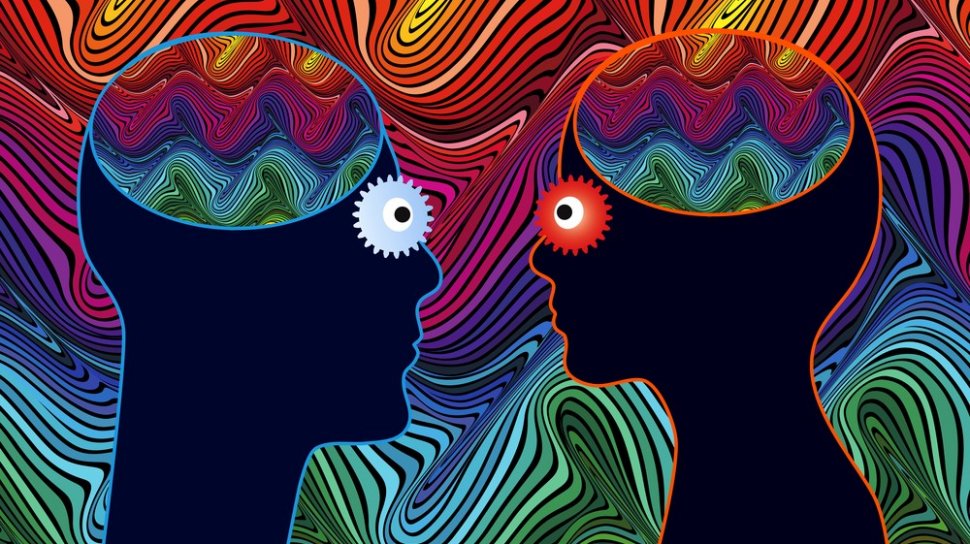Hallucinations, perceptual disorders

Hallucinations are perceptual disorders that cause someone
to see, hear, or smell something that is not really there. Hallucinations can
be caused by mental disorders, certain illnesses, or side effects of drugs.
Hallucinations can also be accompanied by delusions, that
is, belief in something that does not exist or does not correspond to the
actual situation. For example, someone feels he has power and is very close to
famous people, when in reality he is not. Hallucinations accompanied by
delusions are usually experienced by people with psychosis and schizophrenia.
Symptoms of
Hallucinations
Symptoms of hallucinations can be distinguished according to
its type, namely:
Hallucinations of vision
People with visual hallucinations will see something that is
not really there. Objects that are seen can be humans, objects, or light.
Hearing hallucinations
Hearing hallucinations suffer hearing sounds, commands or
threats that are not there.
Smell hallucinations
People who smell hallucinations will smell nice or
unpleasant odor, even though the smell is actually not there.
Hallucinations of taste
Hallucinations of this type of person will taste a strange
taste, for example the taste of metal, on the food or drink he consumes, even
though the taste is actually not there.
Hallucinations of touch
The sufferer feels as if someone is touching or touching
him, or feels like an animal is crawling on his skin, when in fact there isn't.
When to see a doctor
Check with your doctor if you experience the hallucinatory
symptoms mentioned above, especially if they occur frequently and they
interfere with daily activities.
Seek immediate medical attention if hallucinations encourage
you to take dangerous actions, both for yourself and others.
Causes of
Hallucinations
The causes of hallucinations vary greatly, ranging from
mental disorders to physical illness. In addition, hallucinations can also
occur due to side effects of drugs used to treat depression, epilepsy, and
Parkinson's disease.
Mental disorders
Hallucinations can be caused by a number of mental disorders
below:
Schizophrenia
Psychosis
Bipolar disorder
Depression with psychotic disorders
Delirium or dementia
Borderline personality disorder
Post-traumatic stress disorder
Physical illness
Several types of diseases below can cause hallucinations:
High fever (especially in children and the elderly)
Parkinson's disease
Alzheimer's disease
Brain tumor
Migraine
Epilepsy
Stroke
Charles Bonnet's Syndrome
Other conditions
Hallucinations can also be caused by a number of the
following conditions:
Alcohol abuse and drug use
Sleep disturbance
Head injury
Hallucinations
diagnosis
The doctor will ask for complaints and history of the
disease, treatment, and family history of the patient, and conduct a physical
examination. After that, the doctor will conduct a supporting examination to
find out the cause of hallucinations, such as:
Blood and urine tests, to see the possibility of infection
and alcohol and drug abuse.
EEG (electroencephalogram), which is an examination of the
electrical activity of the brain to see if hallucinations are caused by
epilepsy.
CT scan and MRI scan, to detect strokes and the possibility
of injury or tumor in the brain.
Hallucinations Treatment
Hallucinations treatment depends on the cause. The doctor
will prescribe medication if hallucinations are caused by mental disorders,
epilepsy, or migraines. However, in hallucinations caused by brain tumors, the
doctor will perform a surgical or radiation procedure.
The doctor will also recommend cognitive behavioral therapy,
especially in hallucinatory patients caused by mental disorders. This therapy
can help patients deal with fear or paranoia.
Hallucination
Prevention
Hallucinations can be prevented by doing routine checks when
you experience mental disorders or health problems that can cause
hallucinations.
In addition, to prevent hallucinations, you are also advised
to:
Manage stress well, for example by doing relaxation
techniques.
Avoid using drugs.
Limit consumption of alcoholic drinks.
Enough sleep.
0 Response to "Hallucinations, perceptual disorders"
Post a Comment